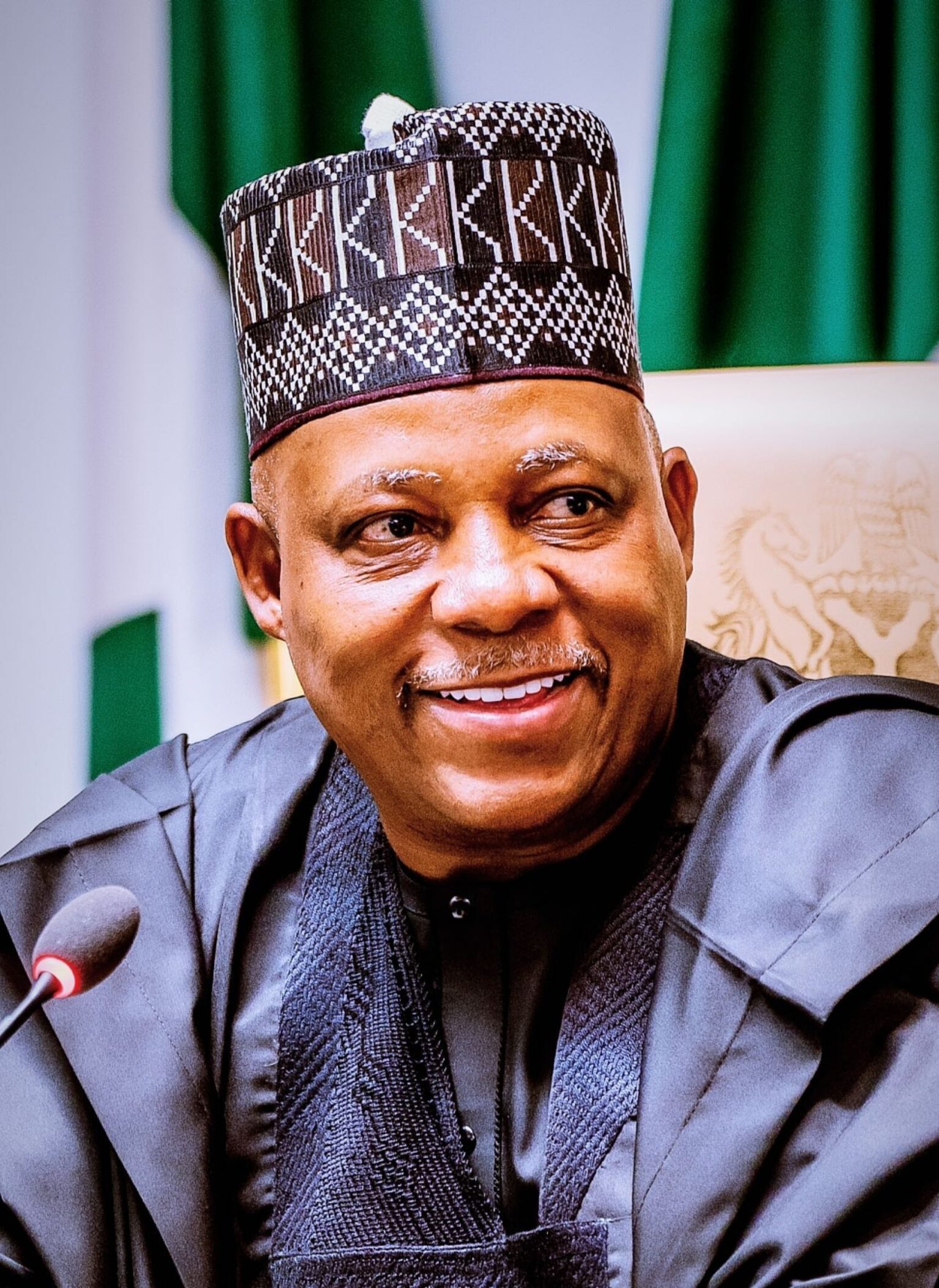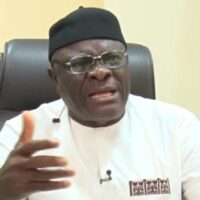Vice President Kashim Shettima, has described Nigeria’s 25.6% of out-of-school children as a threat to the Country’s future.
He stated this at a two-day International Conference on Girl Child Education in Nigeria held at the Banquet Hall of the State House Abuja, during which he noted that the North has the highest number of figures.
“We cannot allow ourselves to be held hostage by these frightening numbers as the consequences is dire and far reaching. Now is the time to treat them as an emergency, and the only way forward is to take specific action plans that address the unique needs and barriers in each region,” Shettima declared at the event attended by development partners including the World bank, UNICEF, British Council, Oando Foundation, UNESCO, FCDO, Newglobe, Plateform Petroleum.
“States in the north west and north east face the highest out of school rates in Kebbi, Zamfara, and Bauchi for example, more than 60% of primary school age children are not in school with Kebbi at a staggering 64.8%. The secondary school numbers are similarly alarming with Bauchi at 66.75% Kebbi at 63.8% and Jigawa, which is my own state, at 62.6%,” he said.
Represented at the event by the Deputy Chief of Staff to the President, Ibrahim Hadejia, Vice President Shettima said, “This is a mirror from which we cannot afford to look away because the consequences are dire and far-reaching.”
Senator Shettima noted that the dignity of the girl child defines every civilization.
He said, “Today, we are bound by a duty higher than merely observing the challenges before us.
We bear the responsibility of setting the tone for this nation, and there is no greater calling than to prioritize the education of the girl child and others. This is a mirror from which we cannot afford to look away because the consequences are dire and far-reaching.
“The statistics of our out-of-school children in Nigeria are a stark reminder of the urgency of this mission. The latest multiple indicator cluster survey showed that 25.6% of children of primary school age are out of school, and this rate rises to 29.6% for secondary school-age children, each child, abandoned to the streets, is a liability that the nation will one day pay for.
“We must therefore remember that the child who remains out of school today will be a threat to their peer in the classroom tomorrow, and we cannot afford to turn away from this reality, and the need for creative and innovative solutions is now more present than ever.”
“The issue of girl child education is for every nation, but in our part of the world, her vulnerability is especially pronounced. Her education is more than a moral obligation. It is the stabilizing force of our economic and social order, for every additional year a girl remains in school, her future earning potential increases, infant mortality rates decrease, and poverty levels in communities fail.
“We see this reflected in the gender parity index, which shows that girls have almost caught up with boys at the primary school level with a ratio of 0.99 and even surpassed boys at secondary school level with a ratio of 1.08. These gains are, however, at risk unless we intensify our interventions to reach every girl, particularly in areas where barriers remain strongest.
“This is why, at the National Economic Council, we have set out to guarantee the future of a girl child, adopting education as one of our critical thematic areas of intervention, alongside health, nutrition and employability in a rapidly changing world.
“We have set the ambitious goal of achieving 0.6 score on the World Bank’s human capital index, and we understand that the road to this objective involves increasing years of schooling, improving the quality of education and ensuring that no child, especially no girl child, is left vulnerable or out of school.”
The Vice President, however, stated that education financing remained a critical aspect of the President Bola Tinubu-led government strategy hence the country has seen a significant increase in education expenditure.
“For example, in 2022 states spent 1 trillion Naira on education, representing 12% of total expenditures. By 2024, States committed 2.4 trillion to education, while the federal government allocated 2.2 trillion. This bring the combined total allocation to 4.6 trillion naira.
“Although states have 14% of their budgets dedicated to education, we must aim higher. Our campaign to see 15 to 20% of state budget allocated to education is not just a target, but a necessity as it is the surest way to guarantee the future of our children and our nation,” he stated.
While calling for partnership with the administration to address the issues, Shettima said the stakes are high and the risk posed by each out-of-school child should be a concern to all stakeholders.
“What we need is a concerted, multi-sectoral approach. The Federal Government, states, local governments, civil society and our partners in the donor community must come together with a singular focus, ensuring that every Nigerian child, regardless of gender or geography, receives quality education.
“We must combine our advocacy and awareness campaigns as championed by the human capital development program, with practical interventions like increasing budgetary allocation to the education sector.
“Whatever reforms we adopt to build a safe space for educating the girl child must be championed from within our communities. Policy making involves all of us, and we must engage local leaders, traditional rulers and religious figures to understand the implications of failing to educate the future of this nation,” he added.
On its part, the Nigerian Governors Forum (NGF) identified practices such as early marriage, early childbearing, poverty, illiteracy, gender-based violence, and other forms of discrimination as factors that have continued to violate girls’ rights to education in the country.
Chairman of the NGF and Governor, Kwara State, Abdulrahman Abdulrazaq expressed concern over the rising number of out-of-school children, pervasive learning poverty, and the insufficient capacity of teachers to foster empowerment through education.
He lamented that despite efforts to reverse the situation, the empowerment of the girl child is still hindered by inadequate access to quality education.
He said the conference under the theme “Girl child empowerment through quality education” was therefore a clarion call on the authorities to take decisive action with a view to reversing the trend.
According to him, quality education remains the cornerstone of national socioeconomic development. Achieving this requires robust education financing, highly qualified teachers, comprehensive instructional materials, strong advocacy, and the provision of necessary infrastructure. Initiatives to re-enroll children in schools, improve learning outcomes, and secure adequate funding are essential to ensuring that every child receives a quality education.
“Our goals include enhancing basic numeracy and literacy, increasing primary school enrollment to reduce the number of out-of-school children, and ensuring smooth transitions from primary to secondary education. The states are resolutely committed to addressing these challenges for the betterment of our society.
“There is renewed vigor in advocating for increased education financing by the states. The NGF champions the advocacy for effective and sustained budgetary resource allocation to the education sector at both federal and state levels. In 2022, states allocated N1 trillion (12%) of their total expenditures to education.
This increased to N1.6 trillion in 2023 and further to N2.4 trillion in 2024, alongside the federal allocation of N2.2 trillion.
Governor Abdulrazak however, noted that states including Lagos, Enugu, Kaduna, Abia, Ogun, Kano, Oyo, Jigawa, Niger, Akwa Ibom, and Kwara have made substantial contributions, with many meetings or exceeding the international benchmark of allocating at least 15% of their budgets to education.
“These efforts underscore the positive trajectory of education financing by sub national governments,” the NGF chairman said. (Channels TV)






